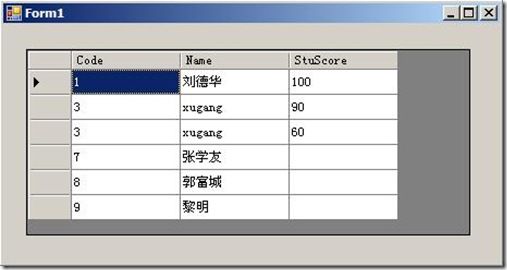三层结构
引用:
如果不使用数据库中的 view 视图,那么在三层结构的开发环境下,如何实现两表或多表( join table )联接查询所需要的显示结果呢?
为了直观揭露实现办法的本质,于是在此弱化了一些操作步骤,如:配置文件保存连接字符串、数据访问类( DBHelper.cs )访问数据库等的具体实现。
在本示例的数据库中:学生信息表(Students)与成绩表(Score)是一对多的关系( 1:N )。
实体层(Entity):
Student.cs
 Student.cs
Student.cs
using System.Collections.Generic;
using System.Text;
namespace Entity
{
public class Student
{
int code;
public int Code
{
get { return code; }
set { code = value; }
}
string name;
public string Name
{
get { return name; }
set { name = value; }
}
}
}
Student.cs
Code highlighting produced by Actipro CodeHighlighter (freeware)
http://www.CodeHighlighter.com/
-->using System;
using System.Collections.Generic;
using System.Text;
namespace Entity
{
public class Student
{
int code;
public int Code
{
get { return code; }
set { code = value; }
}
string name;
public string Name
{
get { return name; }
set { name = value; }
}
}
}
Score.cs
 Score.cs
Score.cs
using System.Collections.Generic;
using System.Text;
namespace Entity
{
public class StuScore
{
int stuID;
public int StuID
{
get { return stuID; }
set { stuID = value; }
}
float score;
public float Score
{
get { return score; }
set { score = value; }
}
}
}
Score.cs
Code highlighting produced by Actipro CodeHighlighter (freeware)
http://www.CodeHighlighter.com/
-->using System;
using System.Collections.Generic;
using System.Text;
namespace Entity
{
public class StuScore
{
int stuID;
public int StuID
{
get { return stuID; }
set { stuID = value; }
}
float score;
public float Score
{
get { return score; }
set { score = value; }
}
}
}
数据访问层(DAL):
StudentDAL.cs
 StudentDAL.cs
StudentDAL.cs
using System.Collections.Generic;
using System.Text;
// myself
using System.Data.SqlClient;
using Entity;
namespace DAL
{
public class StudentDAL
{
public List < Student > GetAllStudent()
{
List < Student > allStudent = new List < Student > ();
string strCon = " server=.;database=S100201A;uid=sa;pwd=sa; " ;
string sql = " select SCode,SName from Students " ;
SqlCommand cmd = new SqlCommand(sql, new SqlConnection(strCon));
cmd.Connection.Open();
SqlDataReader dr = cmd.ExecuteReader();
while (dr.Read())
{
Student stu = new Student();
stu.Code = ( int )dr[ 0 ];
stu.Name = dr[ 1 ].ToString();
allStudent.Add(stu);
}
return allStudent;
}
}
}
StudentDAL.cs
Code highlighting produced by Actipro CodeHighlighter (freeware)
http://www.CodeHighlighter.com/
-->using System;
using System.Collections.Generic;
using System.Text;
//myself
using System.Data.SqlClient;
using Entity;
namespace DAL
{
public class StudentDAL
{
public List<Student> GetAllStudent()
{
List<Student> allStudent = new List<Student>();
string strCon = "server=.;database=S100201A;uid=sa;pwd=sa;";
string sql="select SCode,SName from Students";
SqlCommand cmd = new SqlCommand(sql, new SqlConnection(strCon));
cmd.Connection.Open();
SqlDataReader dr = cmd.ExecuteReader();
while (dr.Read())
{
Student stu = new Student();
stu.Code = (int)dr[0];
stu.Name = dr[1].ToString();
allStudent.Add(stu);
}
return allStudent;
}
}
}
ScoreDAL.cs
 ScoreDAL.cs
ScoreDAL.cs
using System.Collections.Generic;
using System.Text;
// myself
using Entity;
using System.Data.SqlClient;
namespace DAL
{
public class ScoreDAL
{
public List < StuScore > GetAllScore( int code)
{
List < StuScore > StuScores = new List < StuScore > ();
string strCon = " server=.;database=S100201A;uid=sa;pwd=sa; " ;
string sql = " select StudentID,Score from Score where StudentID= " + code;
SqlCommand cmd = new SqlCommand(sql, new SqlConnection(strCon));
cmd.Connection.Open();
SqlDataReader dr = cmd.ExecuteReader();
while (dr.Read())
{
StuScore stuScore = new StuScore();
stuScore.StuID = ( int )dr[ 0 ];
stuScore.Score = Convert.ToSingle(dr[ 1 ]);
StuScores.Add(stuScore);
}
return StuScores;
}
}
}
ScoreDAL.cs
Code highlighting produced by Actipro CodeHighlighter (freeware)
http://www.CodeHighlighter.com/
-->using System;
using System.Collections.Generic;
using System.Text;
//myself
using Entity;
using System.Data.SqlClient;
namespace DAL
{
public class ScoreDAL
{
public List<StuScore> GetAllScore(int code)
{
List<StuScore> StuScores = new List<StuScore>();
string strCon = "server=.;database=S100201A;uid=sa;pwd=sa;";
string sql="select StudentID,Score from Score where StudentID="+ code;
SqlCommand cmd = new SqlCommand(sql, new SqlConnection(strCon));
cmd.Connection.Open();
SqlDataReader dr = cmd.ExecuteReader();
while (dr.Read())
{
StuScore stuScore = new StuScore();
stuScore.StuID = (int)dr[0];
stuScore.Score = Convert.ToSingle(dr[1]);
StuScores.Add(stuScore);
}
return StuScores;
}
}
}
业务逻辑层(BLL):
StudentAndScore.cs
 StudentAndScore.cs
StudentAndScore.cs
using System.Collections.Generic;
using System.Text;
namespace BLL
{
/// <summary>
/// 封装一个包含2张表字段的实体
/// </summary>
public class StudentAndScore
{
int code;
public int Code
{
get { return code; }
set { code = value; }
}
string name;
public string Name
{
get { return name; }
set { name = value; }
}
float ? stuScore;
public float ? StuScore
{
get { return stuScore; }
set { stuScore = value; }
}
}
}
StudentAndTeacherBLL.cs
 StudentAndTeacherBLL.cs
StudentAndTeacherBLL.cs
using System.Collections.Generic;
using System.Text;
// myself
using DAL;
using Entity;
namespace BLL
{
/// <summary>
/// 获得2张表对应的数据
/// </summary>
public class StudentAndTeacherBLL
{
/// <summary>
/// 注意:该方法获得所有学生的成绩,
/// 属于“左外联接”(当没有成绩时,成绩显示为空)。
/// 若要实现“内联接”的显示效果,
/// 则去掉:if(stuScores.Count == 0) 的判断即可!
/// </summary>
/// <returns> 2张表数据的结果集 </returns>
public List < StudentAndScore > GetStudentAndTeacher()
{
// 用来保存结果集
List < StudentAndScore > allStudentAndScore = new List < StudentAndScore > ();
// 获得所有学生的信息
List < Student > students = new StudentDAL().GetAllStudent();
foreach (Student stu in students)
{
// 根据学号获得该学生的所有成绩
List < StuScore > stuScores = new ScoreDAL().GetAllScore(stu.Code);
if (stuScores.Count == 0 ) // 如果没有该学生的成绩
{
// 用来保存单个联接实体
StudentAndScore studentAndScore = new StudentAndScore();
studentAndScore.Code = stu.Code;
studentAndScore.Name = stu.Name;
studentAndScore.StuScore = null ; // 成绩为null
// 添加到结果集
allStudentAndScore.Add(studentAndScore);
}
else // 如果有该学生的成绩
{
foreach (StuScore SScore in stuScores)
{
// 用来保存单个联接实体
StudentAndScore studentAndScore = new StudentAndScore();
studentAndScore.Code = stu.Code;
studentAndScore.Name = stu.Name;
studentAndScore.StuScore = SScore.Score;
// 添加到结果集
allStudentAndScore.Add(studentAndScore);
}
}
}
return allStudentAndScore; // 返回结果集
}
}
}
用户界面层(UI):
Form1.cs
 Form1.cs
Form1.cs
using System.Collections.Generic;
using System.ComponentModel;
using System.Data;
using System.Drawing;
using System.Text;
using System.Windows.Forms;
// myself
using BLL;
using Entity;
namespace JoinSelect_3Layer
{
public partial class Form1 : Form
{
public Form1()
{
InitializeComponent();
}
private void Form1_Load( object sender, EventArgs e)
{
List < StudentAndScore > stus = new StudentAndTeacherBLL().GetStudentAndTeacher();
dataGridView1.DataSource = stus;
}
}
}
Form1.cs
Code highlighting produced by Actipro CodeHighlighter (freeware)
http://www.CodeHighlighter.com/
-->using System;
using System.Collections.Generic;
using System.ComponentModel;
using System.Data;
using System.Drawing;
using System.Text;
using System.Windows.Forms;
//myself
using BLL;
using Entity;
namespace JoinSelect_3Layer
{
public partial class Form1 : Form
{
public Form1()
{
InitializeComponent();
}
private void Form1_Load(object sender, EventArgs e)
{
List<StudentAndScore> stus = new StudentAndTeacherBLL().GetStudentAndTeacher();
dataGridView1.DataSource = stus;
}
}
}
显示结果如下:
说明:Code、Name 字段来自信息表(Students),而StuScore 字段来自成绩表(Score)。

